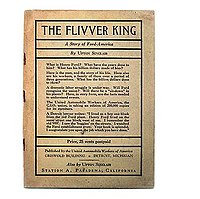 Cover of the 1st edition, 1st printing, Published by the UAW, Detroit, MI., 1937, "Price 25 cents postpaid" | |
| Author | Upton Sinclair |
|---|---|
| Language | English |
| Genre | historical fiction |
| Publisher | United Automobile Workers (1937), Charles H. Kerr (1984) |
Publication date | 1937, 1984 |
| Publication place | United States |
| Media type | |
| Pages | 119 |
| ISBN | 0-88286-054-2 (Charles H. Kerr edition, 1984) |
| OCLC | 21023048 |
The Flivver King: A Story of Ford-America is a 1937 novel written by American muckraker and author Upton Sinclair. The plot revolves around the lives of generations of the Shutt family and their relationship with Henry Ford and the Ford Motor Company.